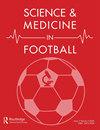Sleep patterns of elite youth team-sport athletes prior to and during international competition
IF 2.8
2区 医学
Q1 SPORT SCIENCES
引用次数: 4
Abstract
ABSTRACT Objective: To examine the effects of international competition on sleep patterns of elite youth team-sport athletes from two national squads compared to a baseline period. Methods: Fifty elite male youth rugby players from two squads were assessed two weeks before (HOME) and throughout two match-day cycles (matchday−1, matchday, matchday+1) of an international competition (COMP). Players were selected to represent their nation during the Six Nations Festival and completed daily self-reported sleep diaries before and during a competitive period. Linear mixed models were used to examine differences between HOME and COMP, and within camp days. Effect sizes±90% confidence intervals (ES±90%CI) were calculated to quantify the magnitude of pairwise differences. Results: Participants spent more time in bed (34.6±13.9 min; ES=0.26±0.19), slept for longer (35.4±12.7 min; ES=0.30±0.19), and woke up later (36.5±9.5 min; ES=0.41±0.20) in COMP compared to HOME, but maintained their regular bedtime (−1.8±11.2 min; ES=0.02±0.19), sleep onset latency (4.1±3.2 min; ES=0.17±0.25) and rating of sleep quality (0.30±0.17; ES=0.17±0.19). Conclusions: Elite youth team-sport athletes sleep for longer during a competition camp compared to home resulting from a delay in wake-up times. This highlights the opportunity for implementing interventions to improve sleep patterns in international-level team sport athletes in their daily environment.优秀青年团队运动员在国际比赛前和比赛期间的睡眠模式
摘要目的:研究国际比赛对两国国家队优秀青年团体运动员睡眠模式的影响。方法:对来自两个队的50名优秀男子青少年橄榄球运动员在国际比赛(COMP)前两周(HOME)和两个比赛日周期(比赛日- 1、比赛日、比赛日+1)进行评估。在六国节期间,运动员被选中代表他们的国家,并在比赛前和比赛期间完成每日自我报告的睡眠日记。线性混合模型用于检验HOME和COMP之间以及营地内的差异。计算效应量±90%置信区间(ES±90% ci)来量化两两差异的大小。结果:参与者在床上的时间更长(34.6±13.9 min;ES=0.26±0.19),睡眠时间较长(35.4±12.7 min;ES=0.30±0.19),醒来时间较晚(36.5±9.5 min;与HOME组相比,COMP组的ES=0.41±0.20),但保持了正常的就寝时间(−1.8±11.2分钟;ES=0.02±0.19),睡眠开始潜伏期(4.1±3.2 min);ES=0.17±0.25),睡眠质量评分(0.30±0.17;ES = 0.17±0.19)。结论:与在家相比,优秀的青年团队运动员在比赛营中睡眠时间更长,这是由于起床时间的延迟。这突出了在日常环境中实施干预措施以改善国际水平团队运动运动员睡眠模式的机会。
本文章由计算机程序翻译,如有差异,请以英文原文为准。
求助全文
约1分钟内获得全文
求助全文

 求助内容:
求助内容: 应助结果提醒方式:
应助结果提醒方式:


